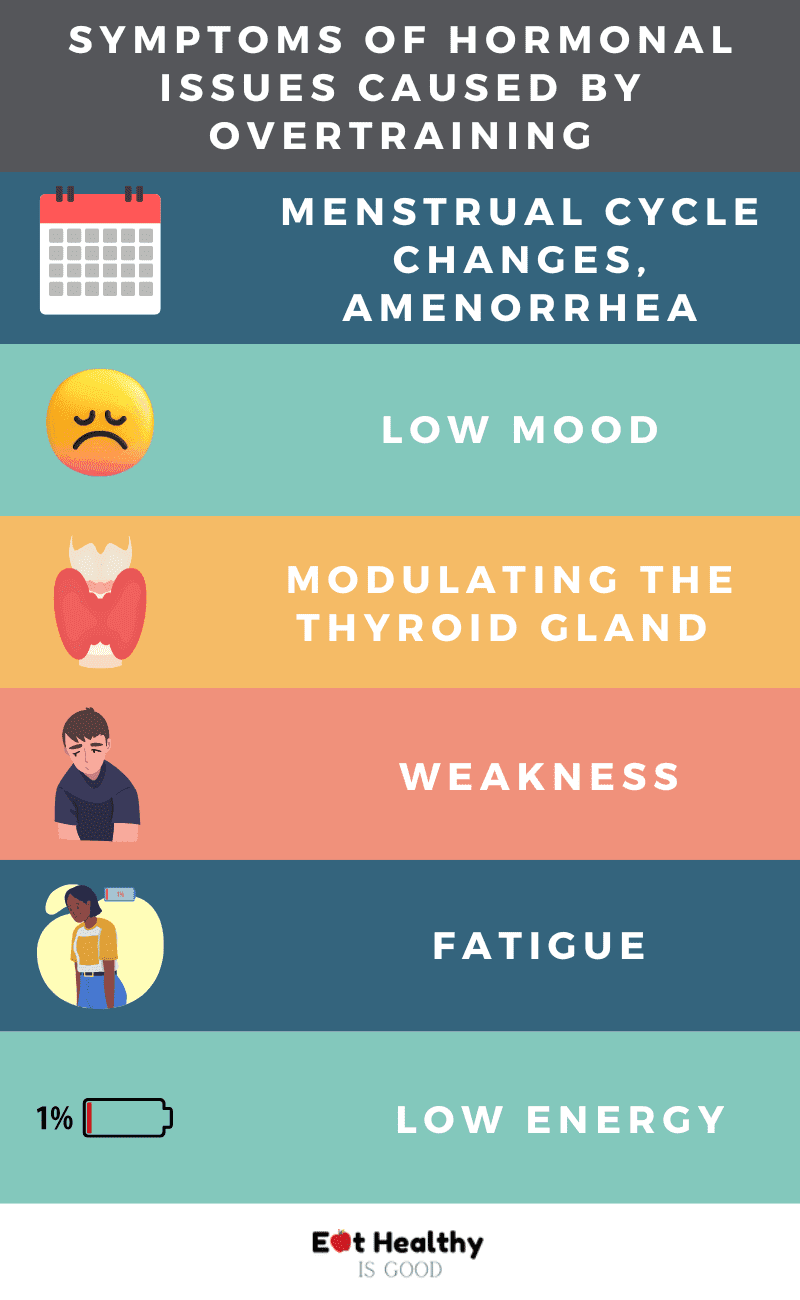Is a ketogenic diet harmful to women’s hormones? Yes, your diet may have an impact on your hormones. Is the keto diet unhealthy for your hormones? No.
In reality, ketosis may benefit women, particularly those with PCOS, endometriosis, and uterine fibroids [1].
In this post, we’ll look at how the ketogenic diet affects your thyroid and the HPA-axis and, how to analyze your hormones, how you feel, and how to change your food and lifestyle.
The Ketogenic Diet and Your Thyroid
Is ketosis harmful to your thyroid? No. Let’s dissect it:
- Low-carb diets (such as the ketogenic diet) and calorie restriction do reduce T3, the thyroid marker hormone [2][3].
- T3 causes your cells to use more energy. Because of its role, experts predict that “a reduction in T3 hormone may increase lifespan by conserving energy and reducing free-radical production [4].”
- These hormones and T4 govern your metabolism, heart rate, and body temperature. Most T3 binds to protein molecules. However, some free T3 circulates in the blood.
However, a low T3 level does not imply thyroid malfunction or hypothyroidism.
Hypothyroidism is frequently characterized by high TSH (thyroid stimulating hormone) values and low free T4 levels. The pituitary gland attempts to stimulate your thyroid gland to generate T4 by producing high amounts of TSH. However, the thyroid is not responding: T4 levels are low.
When T3 levels are low, the thyroid is said to be “euthyroid.” A healthy thyroid. Dr. Anthony’s essay on ketosis and women’s hormones further details what a low-carb diet does to T3, T4, and TSH levels.
Ketosis, the HPA Axis, and Cortisol
The hypothalamus secretes hormones and communicates with the pituitary and adrenal glands to get them to fulfill their responsibilities in creating those hormones, forming the HPA axis.
- No, ketosis does not disrupt the HPA axis. The reverse is true: a ketogenic diet may assist the HPA axis by improving hypothalamic stimulation [5].
- There is no evidence that a ketogenic diet affects the HPA pathway. And other evidence (in mice) suggests that ketone signaling follows a distinct — and likely more efficient — path [6].
- A ketogenic diet increases hypothalamic neuropeptides, superior pathways for hypothalamic activation. Studies have shown ketones to pass the blood-brain barrier and function as signaling molecules on hypothalamic neuropeptides [7].
The ketogenic diet and cortisol:
Cortisol is the infamous stress hormone, although it begins innocently. Cortisol digs into protein reserves and makes glucose for your body to utilize to flee or fight the stress when you are stressed. Isn’t that a good thing?
- However, having persistently high cortisol levels implies having constantly elevated stress levels, and your body and brain begin to weary.
- All of that additional glucose equals high blood sugar, which causes a slew of issues.
Because the ketogenic diet does not modify or enhance the HPA-axis, cortisol, generated within the adrenal gland, is safe. In reality, people in ketosis have low cortisol levels or are unaffected [8][9].
Here are a few things to think about if you’re feeling particularly down:
Are You Overtraining?
Consider your priorities. Is it your HIIT 3+ times per week performance? Or getting into ketosis?
You will overtrain if you attempt both. This can cause cortisol levels to skyrocket (your body is stressed due to what you’re putting it through) and other hormonal issues. Overtraining, not ketosis, is the fundamental cause[*]. A ketogenic diet might be a better fit for strenuous training objectives.
The following are some signs of cortisol increase and other hormonal abnormalities induced by overtraining [10][11]:

Are You In Ketosis?
When AND ONLY WHEN your body breaks down fat into ketones as an energy source, you are in ketosis. How did you find out? By calculating your ketone levels. Because ketones are in your blood, pee sticks, and breath meters are ineffective.
You utilize a blood meter, similar to one used to monitor blood glucose levels. After pricking your finger, set the equipment to measure your BHB (beta-hydroxybutyrate) levels. Without exogenous ketones, your measurement would be continuously over 0.5 in ketosis.
Eating high-fat and low-carb but not in keto
Diets high in fat and low in carbohydrates do not feel pleasant.
If you’re on such a diet to go into ketosis, you could feel awful before you get there. This is known as the keto flu. Your body is shifting gears and objecting. If you do things correctly, you may be able to prevent the keto flu.
Ketosis cannot be compared to a ‘low-carb/high fat but non-ketogenic’ diet [12].
The ketogenic diet manages energy in a completely new way. It crosses the blood-brain barrier, which means your brain is nourished, and feeding your brain implies enhanced mental clarity and physical vigor [13]. You feel fantastic as if you can accomplish anything!
Are You Eating Enough?
If you stick around long enough, you’ll read/hear anecdotes about how being in ketosis aids intermittent fasting (IF). People aren’t as hungry or as hungry as they used to be and have no problem sticking to their fasting schedule [14].
But make no mistake: keto-ers who undertake intermittent fasting for the advantages are obsessive about counting calories and eating enough when they eat. Because calorie restriction makes you feel lousy and has been shown to harm hormones, particularly in women [15][16], it’s not ketosis making you feel awful in this scenario. You need to eat more to sustain your body.
Measure your ketones and food intake to ensure they are enough for the needs of your day.
Are Your Hormones Out of Whack Already?
If your periods have always been awful, or if you have persistent pain that you can’t explain (back ache, severe migraines), you may have a hormonal imbalance that needs to be corrected and discussed with your doctor before embarking on an extreme diet like the ketogenic diet. If you’re already in ketosis, SEE YOUR DOCTOR if you notice any drastic changes such as amenorrhea (absence of menstruation), clotting, discomfort, etc.
Keto and your periods: what to expect (and not to expect)
- You may regain your period after having had an irregular flow for most of your life.
- If you’ve used birth control and stopped or removed the device or have natural amenorrhea (for athletes and nursing moms), your period may return with a heavy flow to begin.
- You may experience heavier than typical bleeding that lasts for a more extended period than usual. Everything will return to normal, or better, as your body adjusts and compensates for the changes in estrogen levels and body fat storage and usage.
- Bloating is not relieved by ketosis. While most other PMS symptoms improve or go (back discomfort, cramps, etc.), bloating persists. A significant estrogen spike during your cycle causes it.
- Hormones influence insulin sensitivity. It is usual for blood glucose levels to rise or fall. It should return to normal after your period.
- Eat if you’re hungry. Your body prepares to produce estrogen and progesterone after ovulation, which might trigger appetite. Choose keto-friendly chocolate, keto cupcakes, or fat bombs, or take the bacon or steak home.
Are You Stressed?
Stress can cause hormonal abnormalities, particularly in women, and stress management may assist in curing such difficulties [17][18].
Instead of strenuous exercise, consider gentle movement such as yoga, meditation, strolling, and writing to regulate your anxiety and stress levels. When your stress is severe enough, you should seek medical attention.
The Bottom Line
Other fundamental causes of hormonal imbalance include:
- Pre-existing hormonal imbalance (not brought on by keto)
- Hypo or hyperthyroidism (not induced by keto)
- Overtraining
- You need to eat more (you feel hungry).
- Stress
Before you and your doctor can conclude/diagnose a terrible experience with ketosis—if you have genuinely been in ketosis—these other factors must be checked out and treated.
Check your ketones and make sure your calorie intake corresponds to the physical efforts you place on yourself. Strive for healthy fitness objectives while keeping your stress levels low.



![How Low Carb and Ketogenic Diets Boost Brain Health [Benefits & Effects]](https://eathealthyisgood.com/wp-content/uploads/2023/11/pexels-ella-olsson-1640773-1-1080x675.jpg)



0 Comments